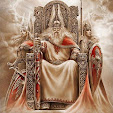Chistopher Columbus (Italian: Cristoforo Colombo, 1451-1506) was an Italian explorer, navigator, colonizer, and citizen of the Republic of Genoa. Under the auspices of the Catholic Monarchs of Spain, he completed four voyages across the Atlantic Ocean. Those voyages and his efforts to establish permanent settlements on the island of Hispaniola initiated the European colonization of the New World.
Western imperialism and economic competition were emerging among European kingdoms through the establishment of trade routes and colonies. Columbus proposed to reach the East Indies by sailing westward, and this eventually received the support of the Spanish Crown, which saw a chance to enter the spice trade with Asia through a new westward route.
During his first voyage in 1492, he reached the New World instead of arriving at Japan as he had intended, landing on an island in the Bahamas archipielago that he named "San Salvador". Over the course of three more voyages, he visited the Greater and Lesser Antilles, as well as the Caribbean coast of Venezuela and Central America, claiming all of it for the Crown of Castile.
Columbus was not the first European explorer to reach the Americas, having been preceded by the Viking expedition led by Leif Erikson in the 11th century, but his voyages led to the first lasting European contact with the Americas, inaugurating a period of European exploration, conquest, and colonization that lasted several centuries.




